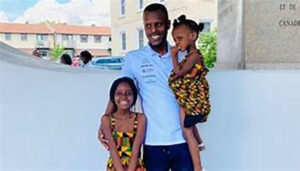Three months, and father still waiting for visa to come to son’s funeral

Franck Ntwari, 41, and Innocent Muhoza, died in a car crash in Ottawa on on August 2nd.
The driver of the other car survived and was extricated from her crumpled vehicle. Shallen McKay was later charged with two counts of impaired driving causing death.
Ntwari’s mother, Mélanie Rubavu travelled from Maine, where she lives, to Ottawa to care his orphaned daughters Christy, age five, and Milly, 10.
But Ntwari’s father, Adolphe Rukenkanya, was away in Burundi, East African and remains at his home after his visitor’s visa application to Canada was refused late last month. The family invited six people from Burundi to the funeral, but only two have seen their visas accepted, while one is still waiting.
According to the family, it took two weeks to identify Ntwari’s body due to significant burns. It took more time to gather the requisite documents before Rukenkanya submitted his application on September 1st. He specified the purpose was to attend his son’s funeral.
Last week, Immigration, Refugees and Citizenship Canada (IRCC) told him it refused his application for a visitor visa because he hadn’t shown convincing proof he would leave Canada, taking into account his financial resources and family ties.
IRCC said that Burundian nationals require visitor’s visas, also known as temporary resident visas, to enter Canada for any short-term period up to six months, including for funerals.
The department said he did not demonstrate he had funds to pay for the trip. It said he has “significant family ties in Canada,” though it did not specify further, citing privacy.
Rukenkanya said he has deep roots in Burundi and would never dream of settling in Canada. He was previously a minister in a Burundian government and he said his wife lives in the United States, not Canada.
Jamie Liew, a professor at the University of Ottawa who studies immigration law, said applications from African countries generally have a relatively lower approval rate compared to other regions.
Liew said officials can take into account humanitarian or compassionate situations in considering an application, but there is no obligation for them to do so.
Ntwari is still unburied three months after his death.
“I don’t see burying my son without his father,” Rubavu said. “It’s too hard. We need family to support us.”
IRCC said people who are otherwise inadmissible can be granted a temporary resident permit on a case-by-case basis, including for “compelling humanitarian and compassionate reasons.”
It said has reopened his application and “security screening results are still pending.”


